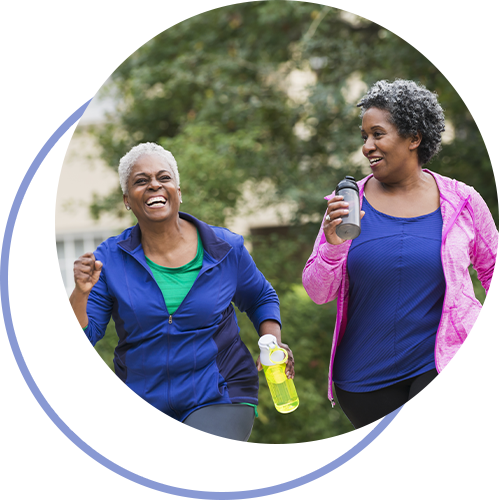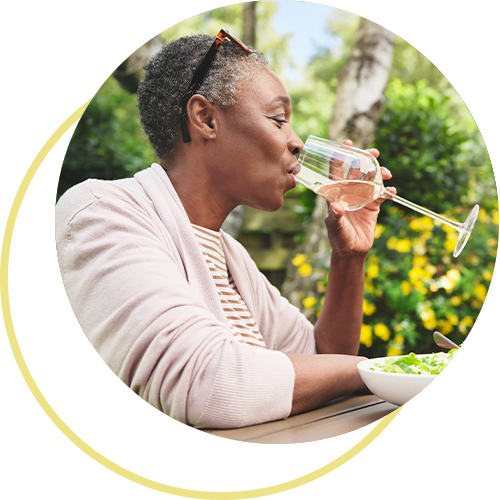Healthy & Active Lifestyles Can Help Prevent Cancer
Breast Cancer Prevention
Welcome to our Breast Cancer Prevention resource center, where we believe in empowering the teachers of communities with the knowledge and tools to lead healthier lives. Our mission is to highlight the crucial role of exercise, balanced nutrition, and mindful lifestyle choices in reducing the risk of breast cancer. By integrating these positive habits into daily routines, educators can teach their communities to take proactive steps towards a healthier future. Join us as we explore practical tips, expert advice, and inspiring stories to help you make informed decisions for a better tomorrow. Together, we can make a difference in the fight against breast cancer.

Daily Exercise Makes a Difference
Engaging in just 25 minutes of exercise each day can significantly reduce the risk of breast cancer. Regular physical activity helps maintain a healthy weight, regulate hormones, and boost the immune system—all of which are key factors in lowering breast cancer risk. Whether it’s a brisk walk, a light jog, or a fun workout class, incorporating daily exercise into your routine is a powerful preventative measure. By prioritizing your health with daily exercise, you can take an active role in breast cancer prevention and improve your overall well-being.
Nutrition is Key
Lorem ipsum dolor sit amet, consectetur adipiscing elit. Nunc eget auctor justo:
- Choose a balanced diet; consume fruits, vegetables, and cereals and reduce salt and sugar intake
- Cut down on processed foods
- Reduce salt intake
- Stay hydrated: consume 3 liters of water daily
- Eat foods with high water content: Cucumber, Celery, lettuce, watermelon, strawberries
- Set drinking volume goals
- Drink less beverages with processed sugar

Nutrition & Health Tips
Nutrition is Key
Breast cancer is one of the most common forms of cancer in women. While genetics and environmental factors play a role, research has also shown that a healthy diet and lifestyle may help reduce the risk of developing breast cancer. Here are some important nutrition facts to consider:
Eating a balanced diet that includes a variety of fruits, vegetables, whole grains, lean proteins, and healthy fats is essential for overall health and can help reduce the risk of breast cancer.
Drinking alcohol has been linked to an increased risk of breast cancer, so it’s important to limit your intake. The American Cancer Society recommends that women limit their alcohol intake to no more than one drink per day.
Some studies have found a link between eating red meat and processed meats, such as bacon and hot dogs, and an increased risk of breast cancer. It’s important to limit your intake of these types of foods and choose lean proteins, such as fish, chicken, and plant-based options, instead.
Eating a plant-based diet that includes plenty of fruits, vegetables, whole grains, nuts, and seeds can provide many nutrients and antioxidants that may help reduce the risk of breast cancer.
Vitamin D plays an important role in bone health and immune function, and some studies have suggested that it may also help reduce the risk of breast cancer. Talk to your healthcare provider about whether you need to take a vitamin D supplement.
Being overweight or obese has been linked to an increased risk of breast cancer, so it’s important to maintain a healthy weight through a combination of a healthy diet and regular physical activity.
Phytoestrogens are naturally occurring compounds found in some plant-based foods, such as soybeans and flaxseeds, that may help reduce the risk of breast cancer. Talk to your healthcare provider about whether adding these foods to your diet is appropriate for you.
Processed foods that are high in sugar, salt, and unhealthy fats have been linked to an increased risk of cancer and other chronic diseases. It’s best to avoid or limit these foods and choose whole, unprocessed foods instead.
If you have breast cancer or are at risk of developing breast cancer, consulting with a registered dietitian can help you develop a personalized nutrition plan that meets your individual needs and goals.


Healthy Choices = Better Tomorrow
Taking steps to reduce the risk of breast cancer can be both simple and empowering. Start by performing regular breast self-exams and scheduling mammograms every 1-2 years from age 40, or earlier if there’s a family history. Chat with your doctor about your risk factors. Maintain a healthy weight through balanced eating and exercise, limit alcohol, and avoid smoking. It is also important to manage stress, avoid toxins, get good sleep, protect your skin, and eat a nutritious diet to contribute to a healthier, happier future.
Healthy Tips for a Better Tomorrow
- Perform breast self-exams regularly to check for any lumps or changes in your breasts.
- Get a mammogram every 1-2 years starting at age 40, or earlier if you have a family history of breast cancer.
- Talk to your doctor about your risk factors for breast cancer and any genetic testing that may be appropriate.
- Maintain a healthy weight through a combination of a healthy diet and regular exercise.
- Limit alcohol consumption to no more than one drink per day.
- Quit smoking or never start smoking.
- Consider breastfeeding, which may help reduce the risk of breast cancer.
- Wear a well-fitting bra to support your breasts and prevent sagging.
- Use caution when using hormonal birth control methods or hormone replacement therapy.
- Get enough vitamin D through diet and/or supplements.
- Consider taking an aspirin or other nonsteroidal anti-inflammatory drug (NSAID) if recommended by your doctor.
- Manage stress through relaxation techniques such as meditation or yoga.
- Avoid exposure to environmental toxins such as pesticides and chemicals.
- Get enough sleep and practice good sleep hygiene.
- Use sunscreen and protective clothing to prevent sun damage to your skin.
- Eat a balanced diet that includes plenty of fruits, vegetables, whole grains, lean protein, and healthy fats.
- Limit intake of red meat and processed meats, which may increase the risk of breast cancer.
- Choose plant-based sources of protein such as beans, lentils, and tofu.
- Avoid or limit processed foods that are high in sugar, salt, and unhealthy fats.
- Incorporate anti-inflammatory foods into your diet such as fatty fish, nuts, and seeds.
- Avoid or limit exposure to radiation.
- Exercise regularly, aiming for at least 150 minutes of moderate-intensity activity per week.
- Limit exposure to endocrine-disrupting chemicals, such as those found in plastics and personal care products.
- Take breaks from sitting for long periods of time.
- Consider genetic counseling and testing if you have a family history of breast cancer.
- Discuss any changes in your breasts with your doctor, including breast pain or discharge.
- Practice safe sex and get regular screenings for sexually transmitted infections.
- Manage any chronic health conditions such as diabetes or high blood pressure.
- Stay up-to-date on your cancer screenings and follow any recommended treatment plans.
- Work with your healthcare team to develop a personalized plan for breast cancer prevention and early detection.
